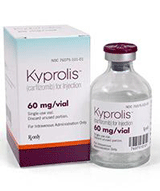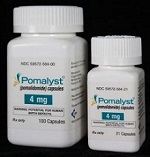
Good news for Amgen ($AMGN) and its quest to gain a multiple myeloma edge over Celgene's ($CELG) Pomalyst: Results are out from a Phase III Kyprolis trial in patients with relapsed forms of the disease--and investigators say they could crown a new standard of care.
In addition to extending progression-free survival to 26.3 months from 17.6 months, the ASPIRE trial showed that adding Kyprolis to a combo of Celgene's Revlimid plus the chemo drug dexamethasone upped overall response rate to 87% from 67%. Plus, three times as many patients showed a complete response to the three-drug cocktail, Amgen said. The regimen also hit secondary endpoints in duration of response and health-related quality of life.
As lead investigator Keith Stewart from Arizona's May Clinic put it, "this is really an important study that's going to set the stage for improved thereapy for patients worldwide," he said, as quoted by Reuters. "It probably establishes this (regimen) as the standard of care."
That's a welcome development for Amgen, which shelled out $10.4 billion last year for Onyx Pharmaceuticals based largely on Kyprolis' potential. So far, the drug has performed well--if not as well as its head-to-head rival from Celgene. Kyprolis racked up $94 million in third-quarter sales--a 21% increase over Q2's haul--helping prompt the California biotech to raise its guidance for the year.
The new data could boost those numbers, and Amgen thinks they may also help it build its case for Kyprolis approval in Europe. In August, the company announced Kyprolis had missed its primary endpoint in the Phase III FOCUS trial, failing to extend survival compared with standard care. Those findings placed it at "a significant regulatory and competitive disadvantage" to key competitor Pomalyst, Sanford Bernstein analyst Geoffrey Porges said at the time.
 |
But now, Kyprolis' standout performance could make up for that miss with regulators--and help it gain some ground on Pomalyst, which put up $181 million in sales for the third quarter, almost twice Kyprolis' total. And that's despite the fact that Pomalyst won FDA approval almost 8 months after Kyprolis did.
For both Kyprolis and Pomalyst, the key to pumping up sales lies in winning approval for patients at earlier stages of the disease. Both Amgen and Celgene have their eyes on first-line and second-line use for the drugs, which would expand their potential markets significantly.
Celgene, for one, is expecting its drug to step up big--and quickly--despite the head-to-head competition: In January, it said it would be looking for $1.5 billion in sales for the new contender by 2017. While Pomalyst drug still has some ways to go--its 2014 bounty stands at $477.6 billion so far--its premium pricing may help it get there. Pomalyst ranked as the No. 7 most expensive therapy in 2013, costing $147,302 per U.S. patient per year.
- read the release
- get more from Reuters
Special Reports: Top 15 Drug Launch Superstars - Kyprolis - Onyx Pharmaceuticals | Pharma's top 10 M&A deals of 2013 - Amgen/Onyx | The top 10 most expensive drugs of 2013 - Pomalyst - Celgene